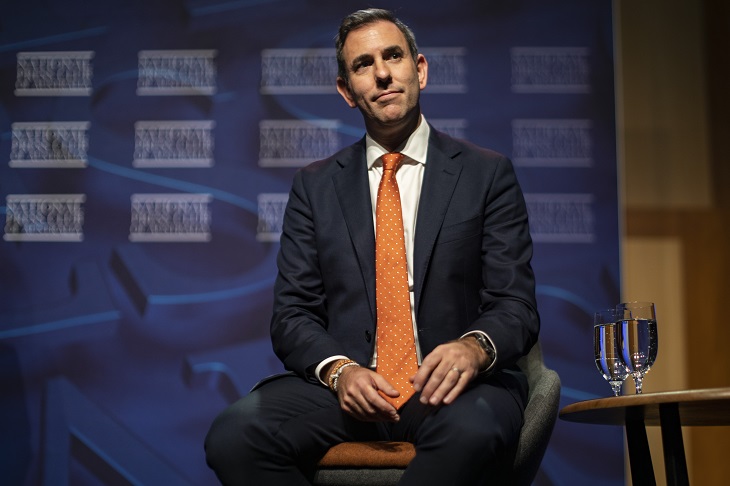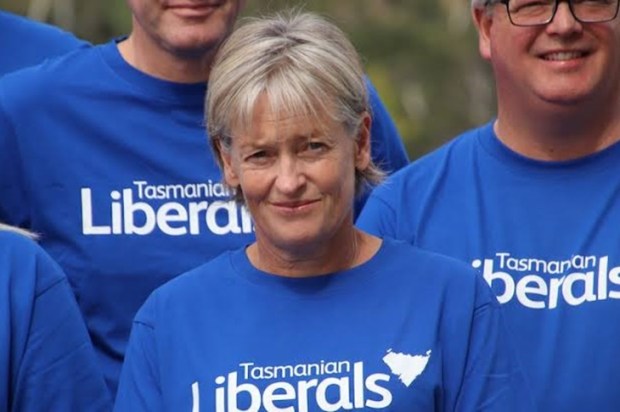Jim Chalmers, Treasurer of Australia, has used his summer to produce a paean to statism. Chalmers’ essay, Capitalism after the Crises, offers a new way forward, allegedly one urgently needed if Australia is to navigate the awaiting catastrophe of the 21st Century’s third decade. The new Australian capitalism, he says, will not be like the old one – the one whose chief proponent, Paul Keating, was the subject of Chalmers’ doctoral dissertation.
The Treasurer begins with some philosophy from Heraclitus, who, Chalmers matter-of-factly tells us, once wrote in a book stored in a temple that, ‘No man ever steps in the same river twice.’ What Heraclitus actually said is unknown, because there are no extant copies of his work. Heraclitus’ alleged claims are only those reported by Plato and others. Still, removed from context and regurgitated glibly, it’s enough for the Treasurer to justify his entrance stage left as the great captain of economic reform, called forth by the storms of history to right a listing ship of state.
Chalmers’ essay is a sentimentalist grab bag of bureaucratic affections, devoid of any substantial data and detail. Rather than chart a compelling case for reform, it masquerades as an attempt at localism, while unveiling itself as a tributary roll call to the bad old angels of globalism and redistributed wealth. In for special mention are two World Economic Forum favourites: Mariana Mazzucato, a glamorous Italian-American economist with a utopian belief in governmental benevolence, and Adam Tooze, the Columbia University history professor who delights in describing a coming ‘Cocktail of Globalisation’.
This is part of what makes Chalmers’ work such an especially poor effort. It is a dull and unimaginative job, devoid of originality, or apprehension to uniquely Australian circumstances. The purport to an original ‘Australian Capitalism’ is entirely fallacious. These are globalist ideas, sloppily and transparently rebranded for local consumption. It is the same tosh trumpeted by the trendy end of the Democratic Party in America, the Labour Party in Britain, and the bland neo-socialists of the European Parliament. At best, Chalmers has written a simping love letter to his contemporary political crushes, with a few lines from the great grandfather of economic interventionism, John Maynard Keynes, thrown in for good measure.
Curiously, Chalmers seems to use Keynes to pirouette into a bizarre kind of political psychoanalysis, claiming one of Keynes’ virtues was to show us how men hold too fast, too long, to failed economic thinking. Seemingly unaware of the irony of quoting Keynes in trying to illustrate persistence with flawed ideology, Chalmers spills much ink on what he calls failed economic ‘mental models’. Aside from vague dismissals of the supply-side economic ethos, no sufficient explanation as to exactly what constitutes these old ‘mental models’ is forthcoming.
Chalmers playbook is near-identical to that of Mazzucato, whose arguments he regurgitates uncritically. They both lack the courage to say Capitalism is wrong, so instead leverage its political legitimacy into their project. Chalmers uses the chimera of a ‘mental model’ as if to say that the Reaganites, Thatcherites, Howardites, and Abbotistas were all ‘doing it the wrong way’. Rhetorically, this preserves the market economy from outright condemnation, so that he can appropriate its brand power, pump it full of redistributive DNA, and recapitulate it as his new, much-vaunted ‘Australian Capitalism’. Perhaps ‘Jimonomics’ would have been a better term. At least that title carries the import of silliness deserved by such a philosophically contorted attempt at political branding.
Utterly predictably, this desire to make the world anew is animated by apparent crisis. And, like his friends at the WEF, Chalmers has decided one is not enough, brilliantly revealing to the Australian public that we are indeed in the grip of a ‘polycrisis’ (cue eye roll).
All this is surplus to the point that what Chalmers intends to do to the Australian economy is not capitalism at all. It is a perverse form of economic preferentialism, dangerous by dent of the government’s incapacity to articulate the values which Chalmers claims will be central to guiding the nation’s investment priorities.
The best contemporary example of how Chalmers intends to contort the Australian economic apparatus lies in the already existent Environmental, Social, and Governance (ESG) model. This is the capital-investment flow model that is decimating human creativity and industrial efficiency across the globe. It has taken down Sri Lanka in a ball of misery. It is cutting a swathe through the archipelago of small and medium-sized businesses which make up the United States’ social lifeblood.
ESG allocates capital according to values superimposed upon markets, instead of values arising organically from within the communities serviced by those markets. In the ESG model, governments, corporate elites, and special interest groups enforce investment priorities driven by their interests and forced upon consumers. For example, in the ESG paradigm, a sugar cane farmer in North Queensland might have his transaction costs driven up because his bank – to meet ESG requirements set forth by metropolitan elites in the south east – needs to hire more ‘diverse’ employees, regardless of whether or not those employees are needed, or can undertake their work with matching or greater efficiency than the existing company average.
Scenarios like the above are not far-fetched. They are playing out all over the world today. And though Chalmers will deny it under the pretext of ‘not picking winners’, similar scenarios are likely, under the purview of what he deems as ‘values-based’ Australian capitalism.
Chalmers’ lack of definition of what those values are should chill the bones of the Australian public. The Treasurer did not say he would carve out special treatment for farmers, or create special taxation categories for the regions, tourism, or defense research and advancement. This would have been a merely questionable strategy, but what he gave us was in fact appalling – a vague promise that ‘values’ really could be driven by government, and that ‘governments and investors can be partners, not protagonists’. What? Did he mean ‘antagonists’? It seems in the Treasurer’s quest to recapitulate the poetic magic of his political ancestor Keating, he’s jumbled up his words…
But the most dangerous error in Jim Chalmers’ undergraduate fantasy is no mere error of vocabulary. As proven with the ESG experiment, an abstract values-driven system of capital allocation would mean values (and costs) imposed on Australian markets. In leaving them undefined, the Treasurer has left the door open to those ‘values’ being dictated by the loudest voices for radical social reform, and the deepest pockets for institutional lobbying.
The combination of these two variables would threaten to unleash a firestorm of special-interest-driven investor behavior, which in turn would drive the Australian economy into an unproductive – and unfair – wasteland. Presently mercifully free of the radical socialism and lobbyist-driven cronyism that drowns Washington and London, Australia stands to blow up its great socioeconomic advantage in entertaining the Treasurer’s absurdly ill-thought-out ideas.
A word on Heraclitus in closing: the Greek Philosopher was renowned, above all, for enunciating the doctrine of ‘flux’. Chalmers has a sentence or two to offer on flux at the end of his essay. But he misses the point completely. Chalmers fails to see what Heraclitus did so clearly – that despite this flux, an atomistic world of constantly moving parts (the always flowing river that Chalmers claims to see) achieves unity in its natural dynamism. A more nuanced reading of Heraclitus shows that the river must change dynamically, without unnecessary restraint, to remain itself. But in Chalmers superficial philosophising, he sees himself as the story’s hero, wading into the stream to save us from disaster.
If we must visit Ancient Greece to find modern Australian economics, then we must also see that Heraclitus’ doctrine of flux makes an argument for market dynamism and organic growth, not market pre-determination according to abstract, and remotely-imposed value sets.
The Treasurer appears to believe in a government bestowed with the requisite omnipotent wisdom to direct the river to its will, on the divine inspiration of some opaque ‘value’. They will man the fords, open the floodgates, and build the dams. The rest of us will just be damned.
Jim, forget stepping into Heraclitus’ river. Throw your head under Lake Burley Griffin for a moment instead. It might just wake you up.
Ben Crocker is a research fellow at Common Sense Society, in Washington DC. His Substack is Crocker’s Columns
Got something to add? Join the discussion and comment below.
Get 10 issues for just $10
Subscribe to The Spectator Australia today for the next 10 magazine issues, plus full online access, for just $10.


























Comments
Don't miss out
Join the conversation with other Spectator Australia readers. Subscribe to leave a comment.
SUBSCRIBEAlready a subscriber? Log in